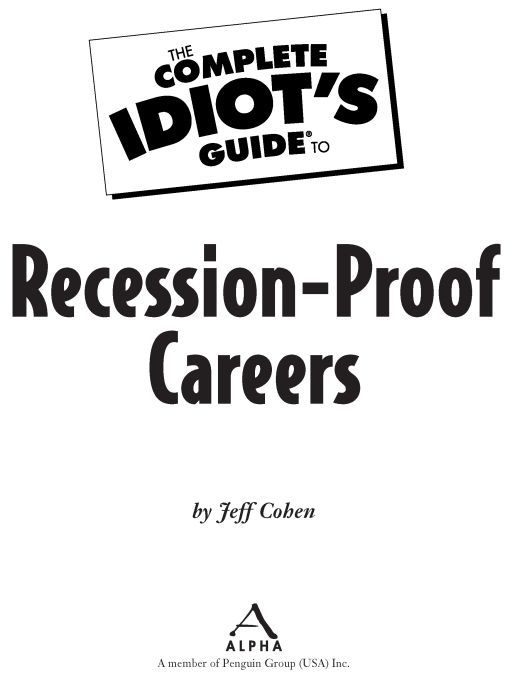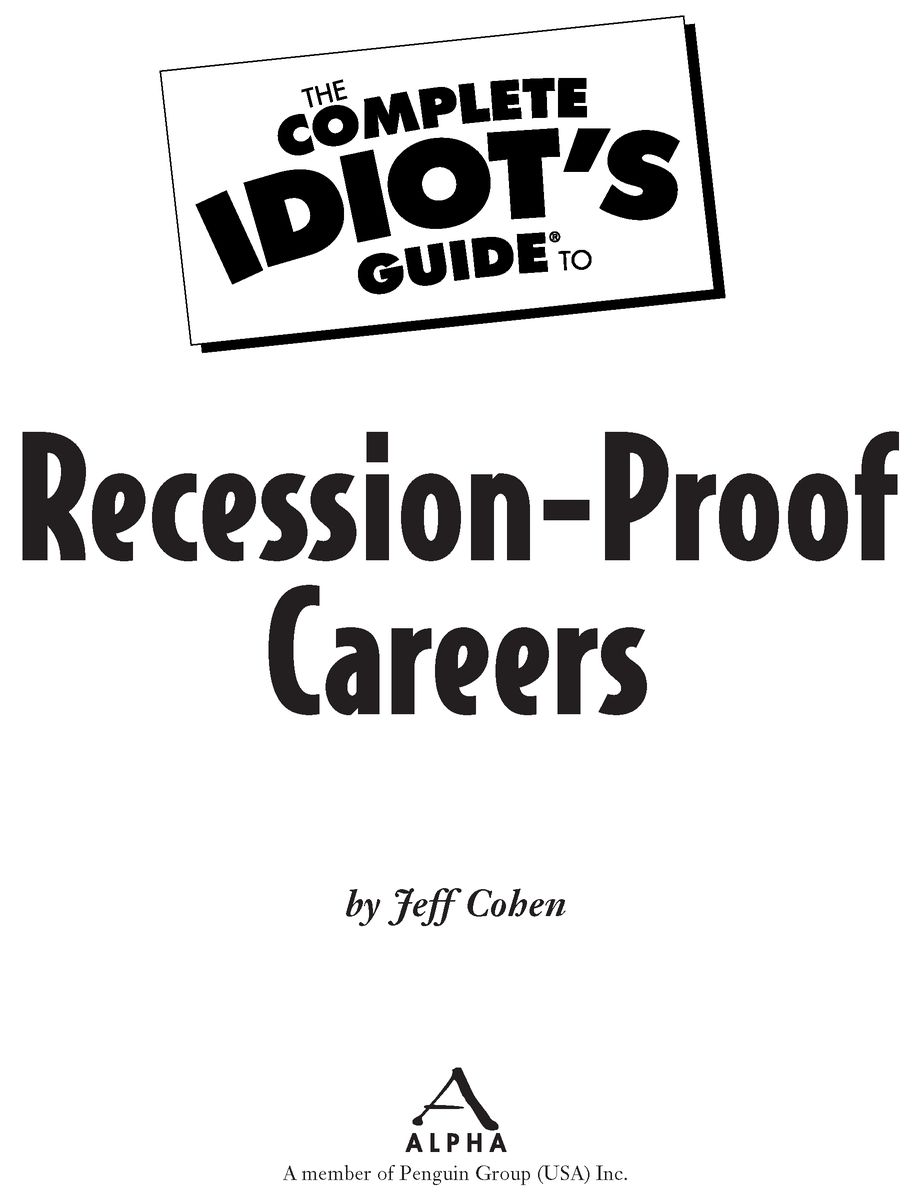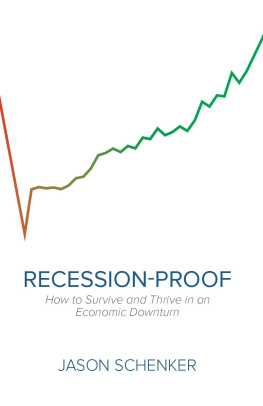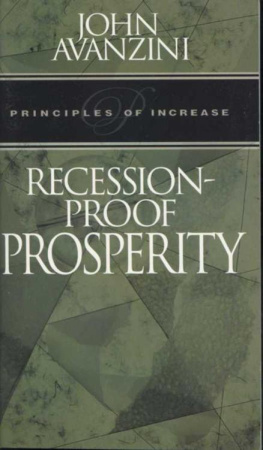Table of Contents
For Gabriel, my little man who is quickly becoming a big boy.
Foreword
One by-product of the current financial turmoil is that hardly a day goes by without some pundit coining a new name for the upheaval. The Second Depression, Great Recession, and Nightmare on Wall Street are just a few that have been bounced around. But whatever name we finally end up with, it is certain to be a turning point in how work is organized. And while the emphasis understandably has been on the pain, economic upheaval also presents opportunities as people draw on creativity to reinvent themselves.
In the past, every broad shift in the economy has resulted in reinventing, redefining, and re-energizing the workforce. The nineteenth centurys Industrial Revolution, culminating in the Great Depression, transformed an agrarian society into an industrialized one marked by a mobile workforce. Stagflation in the 1970s signaled the decline in manufacturing in the United States and the rise of a knowledge-based, service-oriented economy. Finally, the dot-com-driven 2000 recession marked the explosive growth of the Internet and globalization. Each of these periods represented inflection points in employment opportunities and saw the emergence of important industries such as aviation, petrochemicals, and aluminum in the 1930s, and IT and biotech, more recently.
Certain fields and industries present perennial growth. The graying of the U.S. population and technological innovation can be expected to produce high-paying jobs in health care and computers. Openings for dental hygienists, physical therapists, and physician assistants will jump 30 percent to meet demand, while data communications analysts and software engineers should see employment jump significantly, too. Openings in education and government are on the rise as well. Meanwhile, innovation continues at small start-ups and big companies, and federal funding for basic scientific research at universities is fostering breakthroughs in biotech, high-tech, and green technology. These innovations will spur new businesses, industries, and jobs.
But looking for a job is a bit like going on a journey and, as with any journey, its good to have a guide. In Jeff Cohen, you have one of the best. Hes successfully made the transition from a corporate job to an entrepreneurial onereinventing himself, achieving financial security, and maintaining a balance between work and leisure time. But like all good guides, Jeff recognizes that no two paths are identical. So hes organized this guide to let you find the path best suited to your goals, gifts, and strengths, whether you are transitioning to a new career or are a new graduate just starting out.
Recessions present new challenges but also new opportunities. And it calls on both experienced workers and those first entering the workforce to develop new skills that safeguard them from the vagaries of a shifting economy and enable them to compete in a global economy. Good luck as you begin your own personal journey toward finding a recession-proof career.
Clarke Havener, Global Sector Leader, Aerospace and Defense, Korn/Ferry International
Introduction
Maybe you battled through the Great Depression or heard tales of struggle from grandparents. Perhaps you remember the 1970s gas lines the length of football fields. Quite possibly, the 2008 financial collapse cost you 50 percent of your 401(k) and maybe your job. At the very least, youve been around long enough to know economic cycles can inflict mayhem on your financial and career security. But do you really have to live at the mercy of economic booms and busts? What if you could go to work every day protected by a powerful shield? This body armor would repel stock market nosedives, economic meltdowns, and even layoffs. You would sleep well at night knowing your career was protected, your financial well-being intact.
Unfortunately, this career protective shield is not yet available in stores. (Although something tells me it will be an instant bestseller once it lands on shelves.) In the meantime, Im here to offer you something nearly as powerful. Welcome to The Complete Idiots Guide to Recession-Proof Careers. This book, incorporated into your career plan, has the power to fend off pink slips, recession blues, and balance sheets in the red. Youll keep your career on the rise even if the economy is sinking faster than a bottomless boat.
Now, its quite possible youre reading this book during an economic upswing. Corporate earnings could be at record highs. The real estate market could be flourishing. Banks might be back in the black, lending money faster than your Uncle Fred. Before you put this book back on the shelf in favor of a guide to living it up while the going is good, let me ask you one question: Is it possible the good times wont last forever? You want to protect your career and hard-earned dollars just in case economic clouds rear their ugly heads.
I want to help you build a career that thrives in good times
and bad. While the economy undulates, I want your career on a steady climb to retirement bliss. I want you so confident in your career progression that youre unfazed by economic woes. Ultimately, finding and building a recession-proof career comes down to three factors:
1. Growth industries: You have to work in an industry poised to grow for years to come. You cant keep your job if there are no jobs to be found. Thats why this book covers careers in some of the hottest industries, including health care, education, government, and renewable energy.
2. High performance: Working in a high-flying industry is not enough to lock in career success. You have to master the technical competencies, leadership skills, educational requirements, and computer proficiency needed to become an indispensable high performer.
3. Transferable skills: Sure you want to get good at your job, but why not learn skills that make you marketable in multiple careers? If one career starts to lose its luster, you can easily transition to a new job on the rise.
Hows this for a triple book-buyer guarantee? By the time you finish this book, youll be armed with the growth industries, high-performance tips, and transferable skills required to recession proof your career. Youll be so confident in your career outlook that youll never again wonder how youll put food on the table if the stock market plunges.
If I do my job right, youll know your job is safe. So lets get started before the next recession is upon us!
How to Use This Book
The chapters in this book are divided into seven parts that take you on the journey toward a recession-proof career.
Part 1, The Recession Procession, covers recession-proofing basics. Similar to a freshman year 101 course, you learn the fundamentals of building a career that can withstand economic downturns. You read about trends shaping the future job market, how to maximize career stability in any job, and which skills translate best across multiple careers.
Part 2, Heres to Your Health, shows you how to be well off while caring for others well-being. From medical assistants and registered nurses to therapists and pharmacists, you can always find work if you know how to work on a patients mind, body, and soul.
Part 3, Learn to Teach,








